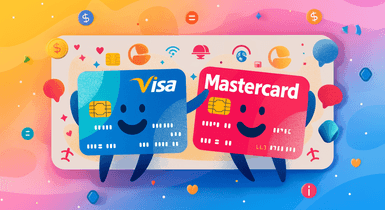Best Credit Cards for Building Credit in 2024
Contents

In 2024, 47% of US shoppers prefer paying for regular purchases with credit cards. However, obtaining plastic money with low ratings can be challenging. That’s why it’s vital to learn how to wisely use credit cards to build credit and to know which ones are the best for this purpose. So, without further ado, let’s dive into this topic!
Credit Cards: Understanding the Basics
The use of credit cards significantly affects your ratings. Most importantly, paying regularly and on time will help build an excellent payment record. Maintaining a low credit use ratio and having accounts active for extended periods might help enhance a rating.
In contrast, mismanaging cards, excessive utilization rates, and hard inquiries can negatively influence credit ratings. Closing an account reduces your credit history, which has a negative effect on your scoring.
Some people have difficulties in obtaining plastic money due to loans or insufficient scores. In this scenario, you’ve got alternate cards to build credit, along with student-specific opportunities.

1. Secured Credit Cards
Opening these ones requires an initial cash deposit that is usually equal to the credit limit. For instance, if you deposit $400, the account is capped at that amount. They are among the easiest credit cards to get approved for because providing “coverage” if you fail to pay your charge reduces the card issuer’s risk.
2. Unsecured Credit Cards
Despite the fact that paying an initial deposit is not required for them, this plastic money isn’t beneficial. Subprime issuers often charge high fees—about $99 per year, with some adding monthly fees for service. You can’t get a refund for expenses like with secured card deposits. Additionally, unsecured cards sometimes feature excessive interest rates and low limits.
3. Student Credit Cards
As the name implies, this plastic money is particularly created for college students with no or minimal credit history. You don’t have to make a down payment, and the overall approval process is easier. Considering college students as valuable long-running clients, bank card providers offer them exclusive products. As reported by Forbes, more than half of all credit cards belong to students.
4. Alternative Underwriting Cards
Applying for the majority of cards without a money deposit demands providing a credit history. This makes it challenging to qualify for a card when you’ve just graduated from college. Some new issuers are solving the problem by using different models or, in other words, risk assessment. These credit card alternatives might incorporate your work, education, or non-debt payouts rather than just looking at your scoring.
5. Plastic Money for Fair Credit
These credit builder cards are a compromise solution for applicants with scores ranging from the low to mid-600s. Though they’re still below the level needed to get the majority of the top deals, they’re better than a low rating. This market segment wasn’t previously developed, but now it’s evolving.
6. Authorized User Cards
People can utilize these ones to add somebody to another’s account. It enables them to pay with plastic money while the primary account holder stays responsible for making the payments. This can be a helpful approach for building or enhancing credit, as the favorable history of a main cardholder can be advantageous for an authorized user. However, the main cardholder must manage the account responsibly because any negative activity, such as missed payments, can affect the authorized user’s rating.
7. Retail Store Cards
A specific retailer issues such cards that are often only valid for use at that retailer or its partners. A poor credit history won’t hinder obtaining this one for credit-building purposes and store-specific perks.
8. Starter Cards
They are not for students but for those who start to build credit. They usually have yearly fees and an increased annual percentage rate.
Best Credit Card for No Credit History People in 2024

Secured Cards: Chime Secured Credit Builder Visa Credit Card
While technically it’s a secured card, you won’t face some of the restrictions common to many cards in this category. First of all, this credit card for no credit history users doesn’t require an initial deposit or a strict credit check. Also, it doesn’t charge any fees or interest and automates payments. However, it’s only available to Chime banking customers. Chime can check your income to see if you’re qualified. It takes no less than $200 in direct deposits to your account during the last year to get the plastic money. The amount you may spend on the card and use to pay down the balance is determined by the amounts sent to the account. In many aspects, it’s very similar to a debit card, except three bureaus get reports about the charges.
Student Plastic Money: Discover it Student Chrome
It’s one of the most popular cards for students, and this is no coincidence. As it doesn’t demand a FICO history, it can be called the best credit card with no credit score for first-time users. It also suggests a straightforward cashback system. This plastic money has no yearly fee, making it a great option for students looking to build credit responsibly.
Starter Cards: Discover it Secured Credit Card
If you are building or rebuilding your credit, you may like this one. A refundable security deposit is required here, and it establishes the credit line. Like Discover it Student Chrome, this one offers cashback benefits and matches all the cash back you’ve earned at the end of your first year.
The card has no yearly fees and offers free monthly entry to your FICO score. If you use an account responsibly, Discover will review it after eight months and promote it to an unsecured card, permitting you to keep the same account.
Final Thought
Determining the perfect plastic money can be tricky. However, by gaining a deeper understanding of the options available, you’ll be well-equipped to find the card that best suits your needs.




